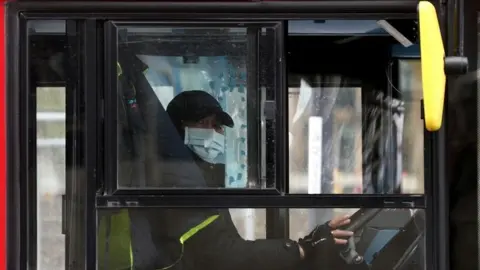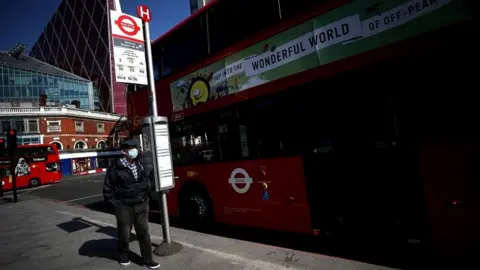Coronavirus: Transport workers 'must not work' without measures
Transport staff should stop working if they are not provided with adequate safety equipment, a union has advised.
The Rail, Maritime and Transport workers (RMT) union said members who were not given the necessary protection measures must refuse to work.
The instruction follows the deaths of 14 transport workers in London, as well as others elsewhere in the UK.
New measures have been introduced for bus workers in the capital but some have said they do not go far enough.
Nine bus workers have died in the capital after contracting coronavirus, while at least three have died elsewhere in the UK including two in the North West and one in the South West, according to the Unite union.
London's Mayor Sadiq Khan has called the deaths "devastating", adding it was "really important we treat public transport workers as heroes".
When asked whether there had been a failure to protect bus drivers when the virus first emerged, Mr Khan said it was "a question I ask myself and my top team all the time".
"We've made sure we've got the most safety measures we can possibly take in London."
Some drivers previously said the protection measures put in place were "inadequate".
Unite, the union representing 20,000 London bus workers, said the deaths of drivers "have got to stop" and "more action is urgently needed".
 Reuters
ReutersThe RMT said there had been "escalating concerns that many employers are not taking steps to protect transport workers".
General secretary Mick Cash said members in rail and bus sectors across the country had been advised to "stop work on safety grounds if employers do not provide protection from Covid-19".
"That means that if they are not provided with PPE, including masks, eye defenders and gloves where necessary, they should not be working," he added.
'Heroic effort'
In London, a four-week trial is due to begin on several Abellio routes operating out of Walworth bus garage, where passengers will only be able to board buses through the middle doors.
Most buses in London have both front and middle doors, with passengers usually using the front ones for boarding.
TfL said the trial would allow it to improve social distancing for drivers while seeing "how the change works in live operations and whether it causes any issues".
Other safety measures being used across the network include signs to discourage people from sitting near the driver and adding an extra layer of protection to the clear screen that separates the driver from passengers.
Anti-viral disinfectant is also being used to clean the interiors of vehicles.
TfL's director of bus operations, Claire Mann, said: "London's hard-working transport workers are making a heroic effort at the frontline of the fight against this pandemic, and it is only right we consider everything we can to protect them."
 Reuters
ReutersTfL said it had worked with Unite and bus operators to improve safety for workers, but the union has called for further "urgent" action.
Regional secretary Pete Kavanagh said there was "no time for trials" and the transport authority "needs to instruct all bus companies to lock front doors with passengers no longer entering the bus next to the driver with immediate effect.
"To improve social distancing, which will protect drivers and passengers alike, the maximum number of bus passengers must also be reduced," he said.
Unite has also called for similar measures to be introduced across the UK, adding transport staff "will start to look at the option to remove themselves" if they were not.

- A SIMPLE GUIDE: How do I protect myself?
- AVOIDING CONTACT: The rules on self-isolation and exercise
- LOOK-UP TOOL: Check cases in your area
- MAPS AND CHARTS: Visual guide to the outbreak
- VIDEO: The 20-second hand wash
- STRESS: How to look after your mental health

Danny O'Hanlon, a bus driver who operates in north London, told the BBC he was always "nervous" and "apprehensive" whenever at work as the way people currently board buses meant "there's automatic contact the minute they get on" while the screen around his cab was also not sealed.
He said he was not living with his wife or four-year-old daughter at present for fear of passing the virus to them.
The number of people using buses in the capital has fallen by about 85% compared to this time last year.
Transport bosses have said they are "encouraged" by the fall in passengers and have called for those who "really have to go to work" to try to avoid the rush hours.

For more London news follow on Facebook, on Twitter, on Instagram and subscribe to our YouTube channel.
